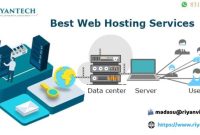Creating a successful online presence requires more than just a great website design; it involves choosing the right hosting service and maintaining your WordPress site effectively. WordPress is one of the most popular content management systems (CMS) in the world, powering over 40% of all websites, according to W3Techs. However, the performance, security, and longevity of your site depend significantly on the quality of your WordPress hosting and ongoing maintenance practices. This comprehensive guide will delve into the essentials of WordPress hosting and maintenance, exploring key aspects that every website owner should consider.
Understanding WordPress Hosting
WordPress hosting refers to a web hosting service specifically optimized for WordPress websites. While many hosting providers offer generic plans that can technically support WordPress, specialized WordPress hosting plans provide enhanced performance, security, and features tailored for WordPress users.
Key Features of WordPress Hosting
- Optimized Performance: WordPress hosting is designed to deliver fast loading times and high uptime rates. This is crucial as website speed directly impacts user experience and SEO rankings. A study by Google showed that 53% of mobile users abandon sites that take longer than three seconds to load.
- One-Click Installation: Most WordPress hosting services offer a simplified installation process that allows users to set up WordPress with just one click. This feature is particularly beneficial for those who may lack technical expertise.
- Automatic Updates: Security vulnerabilities can arise if WordPress, themes, or plugins are not updated regularly. Many hosting providers offer automatic updates for the WordPress core, plugins, and themes, ensuring that your site is always running the latest and most secure versions.
- Enhanced Security Features: WordPress hosting plans typically include built-in security measures, such as firewalls, malware scanning, and DDoS protection. These features help protect your site from malicious attacks and data breaches.
- Expert Support: Many WordPress hosting providers offer specialized customer support staffed by experts familiar with WordPress issues. This level of support can be invaluable when troubleshooting problems or seeking advice on best practices.
Types of WordPress Hosting
When it comes to hosting your WordPress site, there are several types of hosting options available, each catering to different needs and budgets:
1. Shared WordPress Hosting
Shared hosting is the most affordable option where multiple websites share a single server’s resources. This can be a good starting point for small blogs or websites with low traffic.Pros:
- Cost-effective
- Easy to set up
- Sufficient for small websites
Cons:
- Limited resources
- Performance can be affected by other sites on the server
- Less control over server settings
2. VPS WordPress Hosting
Virtual Private Server (VPS) hosting offers more resources and control than shared hosting. Each site is hosted on a virtual server, providing dedicated resources that can improve performance.Pros:
- More resources than shared hosting
- Greater control over server configurations
- Better performance and reliability
Cons:
- Higher cost than shared hosting
- Requires some technical knowledge to manage
3. Managed WordPress Hosting
Managed hosting is a premium option where the hosting provider handles all technical aspects, including updates, backups, and security. This type of hosting is ideal for users who want to focus on content creation rather than server management.Pros:
- Fully managed service
- Optimized for WordPress performance
- Enhanced security features
Cons:
- Higher cost compared to shared and VPS hosting
- Limited control over server settings
4. Dedicated WordPress Hosting
Dedicated hosting provides an entire server exclusively for your website. This option offers maximum performance, security, and customization but comes at a higher price point.Pros:
- Full control over server resources
- Optimal performance and security
- Ability to customize server settings
Cons:
- High cost
- Requires advanced technical knowledge
5. Cloud WordPress Hosting
Cloud hosting utilizes multiple servers to host your website, offering scalability and redundancy. This type of hosting is ideal for websites that experience fluctuating traffic.Pros:
- Highly scalable
- Redundant setup for better uptime
- Pay-as-you-go pricing model
Cons:
- Can be more complex to manage
- Costs can vary based on resource usage
The Importance of WordPress Maintenance
Once your WordPress site is up and running, regular maintenance is crucial to ensure its longevity and performance. Neglecting maintenance can lead to security vulnerabilities, performance issues, and user dissatisfaction, ultimately affecting your site’s success.
Key Aspects of WordPress Maintenance
- Regular Backups: Backing up your website regularly is essential to protect against data loss. Many hosting providers offer automated backup solutions, but it’s also wise to use a reliable backup plugin to ensure you have multiple copies of your content.
- Software Updates: Keeping your WordPress installation, themes, and plugins updated is critical for security and performance. Neglecting updates can expose your site to vulnerabilities and bugs. According to a report by Sucuri, outdated plugins are one of the leading causes of website hacks.
- Security Monitoring: Regularly monitoring your site for security threats is essential. This includes implementing security measures such as firewalls, malware scanning, and regular audits to identify and address vulnerabilities.
- Performance Optimization: Over time, your website may slow down due to various factors, including bloated databases, excessive plugins, and unoptimized images. Regularly optimizing your site by cleaning up the database, compressing images, and using caching plugins can significantly improve performance.
- Content Management: Keeping your content fresh and relevant is vital for SEO and user engagement. Regularly updating blog posts, adding new content, and ensuring that all links are functional will help maintain a positive user experience.
Best Practices for WordPress Maintenance
To keep your WordPress site running smoothly, consider implementing the following best practices:
- Create a Maintenance Schedule: Set aside time each week or month to perform maintenance tasks. This could include updating software, checking backups, and reviewing security settings.
- Use Reliable Plugins and Themes: Choose reputable plugins and themes from trusted sources. Avoid using outdated or poorly maintained plugins, as they can introduce security vulnerabilities.
- Monitor Site Analytics: Use tools like Google Analytics to track user behavior and site performance. Analyzing this data can help you identify areas for improvement and inform your content strategy.
- Optimize Database Regularly: Use plugins like WP-Optimize or WP-Sweep to clean up your database and remove unnecessary data, such as post revisions and spam comments, which can bloat your database.
- Employ a Staging Environment: Before making significant changes to your website, such as updating plugins or themes, consider using a staging environment. This allows you to test changes without affecting your live site.
The Benefits of Combining Hosting and Maintenance
Investing in both quality hosting and regular maintenance can lead to significant benefits for your WordPress site:
1. Enhanced Performance
A well-hosted and maintained WordPress site will load faster, providing a better user experience. Faster websites not only retain visitors but also rank higher in search engine results.
2. Improved Security
By ensuring that your hosting environment is secure and that you are regularly maintaining your site, you can significantly reduce the risk of cyberattacks and data breaches. A secure website builds trust with your audience and protects sensitive information.
3. Increased Uptime
Reliable hosting combined with regular maintenance minimizes downtime. A website that is consistently available to users is more likely to convert visitors into customers.
4. Better SEO Rankings
Search engines prioritize fast, secure, and well-maintained websites. Regularly updating content and optimizing your site will improve your SEO rankings, driving more organic traffic to your site.
5. Enhanced User Experience
A website that performs well, is secure, and is regularly updated provides a better user experience. Satisfied visitors are more likely to return and recommend your site to others, increasing your reach and potential customer base.
Case Study: The Impact of Quality Hosting and Maintenance
Background
Consider the case of “Green Thumb,” a gardening blog that experienced a significant increase in traffic but struggled with performance issues due to inadequate hosting and lax maintenance practices.
Initial Challenges
Green Thumb initially chose a shared hosting plan, which was affordable but lacked the resources to handle increased traffic. As a result, the website frequently experienced downtime and slow loading speeds, leading to frustrated visitors and decreased engagement. Additionally, the site had outdated plugins and themes, leaving it vulnerable to security threats.
Steps Taken
To address these challenges, Green Thumb made the following changes:
- Upgraded Hosting: They switched to a managed WordPress hosting plan that provided enhanced performance and security features tailored for WordPress.
- Implemented Regular Maintenance: Green Thumb established a monthly maintenance schedule, which included regular backups, software updates, and security monitoring.
- Optimized Content: The blog began to focus on content optimization by updating old posts, improving SEO, and ensuring that images were properly compressed.
Results
After implementing these changes, Green Thumb experienced significant improvements:
- Performance: The website’s loading speed improved by 50%, reducing bounce rates and increasing user engagement.
- Security: With regular security monitoring and updates, the site was protected from potential threats, and no security breaches occurred.
- Traffic Growth: Organic traffic increased by 75% over six months, largely due to improved site performance and SEO optimization.
- User Satisfaction: Positive feedback from visitors increased, with many praising the site’s speed and ease of navigation.
Conclusion
WordPress hosting and maintenance are critical components of running a successful online presence. By investing in quality hosting that is optimized for WordPress and adhering to regular maintenance practices




